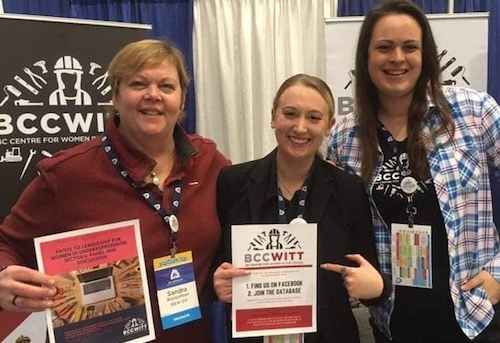New Program to Help BC Centre for Women in the Trades Focus on Retention, Not Just Recruitment

Jan 21, 2019
“Be More Than a Bystander,” a program that works with provincial football team the BC Lions to train men on how to be allies for women, has been tailored to address issues in the building trades. It’s set to launch this month.
Created by the Ending Violence Association, an organization that works to end violence against women, the program is a collaboration with the BC Centre for Women in the Trades.
The centre, headquartered at Vancouver, British Columbia, Local 213 and coordinated by IBEW sisters Sandra Brynjolfson (left and Emelia Colman-Shepherd (left and right, respectively, in the photo), aims to keep women in the trades.
“Be More Than a Bystander,” is the only program Brynjolfson and Colman-Shepherd know of that’s run by tradeswomen, and the only one focused on keeping women in the trades.
“It’s a wasted investment when a woman, a skilled craftsperson, leaves the trade because she doesn’t feel safe, or has to work nonunion because that’s the only place she can get a job,” says Brynjolfson. “Safety and discrimination aren’t women’s issues, they’re workers’ issues. Everybody benefits from a more respectful workplace.”
The number of women in trades has been stuck at roughly 3% for decades, but recruitment may not be the solution. “There’s no point in recruiting women if you’re not doing anything to keep them,” says Lisa Langevin, Assistant Business Manager of IBEW Local 213 in Vancouver, BC.
In 2016, Langevin, who has long supported efforts to diversify the trades, helped secure funding for a study on women in the construction industry, then worked with researchers on the project, which included focus groups and looking at the role of mentoring.
“Nothing in the focus groups was really a surprise,” says Langevin. “It was mostly stuff we already knew.”
What they already knew — but now had the research to back up — was that on a lot of worksites there’s only one woman, and all too often that woman would be the first to get laid off. And getting work itself was hard.
“There’s still a ‘good old boy’ network,” says Langevin. “There’s still discrimination and it’s hard to combat that alone.”
These findings informed the groundwork for what became the BC Centre for Women in the Trades. “The response so far has been overwhelmingly positive and supportive,” says Colman-Shepherd.
Brynjolfson and Colman-Shepherd say Local 213’s support has been vital in making the centre a reality. “The IBEW has been very supportive,” they said. “We wouldn’t be able to do this without them.”
Adapted from an article first published online by the IBEW.









![Guide to the Canadian Electrical Code, Part 1[i], 26th Edition– A Road Map: Section 56](https://electricalindustry.ca/wp-content/uploads/2022/11/Guide-CE-Code-2.png)






